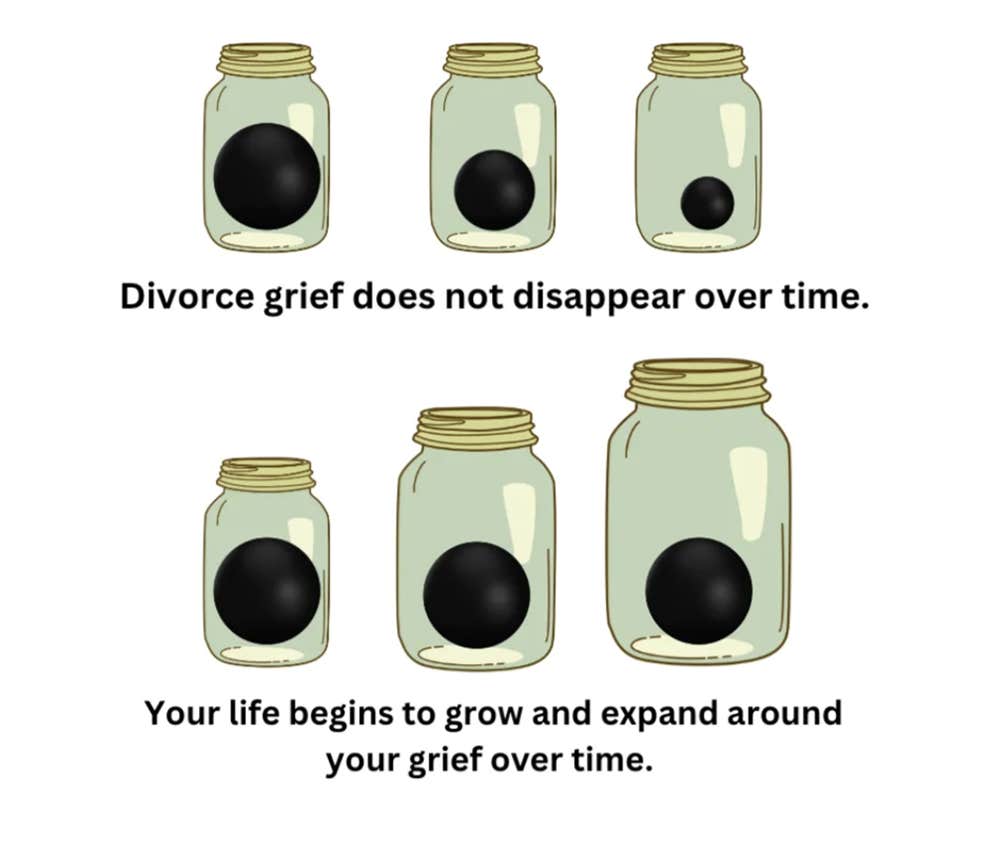Knowing This One Thing Helped Me Recover Faster From My Divorce
I wish I’d known it so much sooner.
 Timur Weber | Canva
Timur Weber | Canva When am I going to feel better? Usually, this is the question front and center of everyone’s mind after they have experienced a separation or divorce.
Like every part of life, ups and downs happen. The challenge we face right after a divorce is that when life throws you one of its inevitably bad times, it’s all magnified by the pain and the fact that your marriage didn’t work out.
You’re left struggling as you’re forced to leave behind every part of what you imagined your life was going to look like when you made your marriage vows. It can skew the way you view life’s unavoidable hardships.
The uncomfortable truth is that you never really get OVER your divorce. Just like you never get OVER the death of someone you loved.
It’s essential to understand this when you’re in the first year or so of trying to recover from the shock of separation.
Divorce is grieving. Once you understand that you are going through grief, you can start to make sense of what is happening to you and develop some realistic timelines to anchor to.
How long are we talking?
I’m in the process of planning a solo trip to Yosemite National Park in the United States this coming September, and I needed to buy some hiking gear.
My ten-year divorce-a-versary* is coming up in December. Ten years since the night that my ex-husband and I looked across at each other in absolute shock as the realization dawned that our marriage was over. (*made up word).
I’m browsing the outdoor store on my own, and in comes a gorgeous little family of four. Dad, mom, 4-year-old son, and 2-year-old daughter. Both as cute as buttons.
They point to things and ask questions in their little chipmunk voices. Their parents are guiding them and chatting with them. They are choosing the colors they like for the clothes they are being bought. They all look super happy.
I am instantly transported back to the day that my ex-husband and I took the kids to buy puffer jackets for our first family trip to the snow. We let them choose the colors they liked the most, and they were so excited about it.
I remember standing there with my ex and discussing what we were going to buy, both of us keeping an eye on the kids as we shopped. As the memories came, words flashed through my head;
- Teamwork
- Family
- Companionship
- Excitement
I felt the familiar stab of grief hit my abdomen. Just a light touch now, but still there. These days though, instead of the old strategy I used of burying it down and denying the pain, I allowed it in.
This is what I said to myself:
“Yeah, it does hurt to remember that. I miss the kids being so little. Sometimes I miss the feeling of having someone to make decisions with. That’s ok. I accept that we are not together anymore. The kids are teenagers now, and my life is changing and evolving in other fulfilling and exciting ways”.
The little stab passed pretty quickly.
After a hugely traumatic and life-altering loss like divorce, understanding grief helps you to integrate rather than deny your pain and heartache.
Integrating vs Enduring
Integrating our loss means accepting it as part of our life journey. One of the many important pieces of the puzzle that make up the unique person you are. It’s part of your story, and your story matters.
Integrating our pain means understanding that it’s not a case of waiting for it to be over or thinking that the memories won’t make us feel sad or regretful at times.
There is a new(ish) way of viewing grief and loss in the clinical world these days. Rather than coming to an endpoint and being ‘over’ grief as we used to understand it, the new model is called ‘growing around grief’.
The grief doesn’t get smaller or go away as we may have once believed. What actually happens is that over time, and with intentional healing and recovery work, your life gets bigger and fuller around the grief.
Here is an image that portrays this concept in a visual diagram:

Credit: Author
RELATED: If You're Heartbroken Over Your Divorce, You Need To Hear This Advice
As you move through the different stages of divorce, you will begin to notice that even as you heal and start to feel better overall, there will always be little things that remind you of times past or things you miss.
You don’t need to fear those feelings.
There was a time when those sorts of thoughts would arise, and I would almost panic. Up would come the anxiety that I’d made a huge mistake by divorcing. I’d fixate, ruminate on regrets, and want to change things that could never be changed.
What I didn’t realize back then was that I was stuck in the ‘bargaining’ part of the grief cycle. Still living in a form of denial that I could go back and change the past.
If I had known back then what I know today, I would have spoken to myself the way I did in the outdoor store.
I would’ve been able to say to myself;
‘This is called bargaining. It’s a natural and normal part of divorce and the grief cycle. It will pass’.
That would’ve lessened my anxiety, fear and pain. It wouldn’t have taken it away completely, but minimized the impact so it didn’t send me into a tailspin and cause me to think that my entire future was ruined.
The ability to understand what you’re feeling and why you’re feeling that way is critical to recovery. It helps you to absorb the shock waves when they come and calm yourself down to a more logical and rational outlook instead of being swept away in the painful emotions that wash over you.
Once grief has been integrated, you can start to imagine a life that involves joy, happiness and optimism again. However, there can still be momentary periods when the acute grief can return.
Without knowing this, you can feel as though you haven’t made any progress or recovery. However, it’s perfectly normal and does not mean that you have gone backwards in your healing. Quite the opposite; it shows that you are healing and recovering just the way you should be.
I’m passionate about helping people understand the grief cycle as they work through their loss after divorce because I know what a huge turning point it was in my recovery.
I know that if I had understood it a lot better, my recovery time would’ve been cut short by several years.
Time is your greatest asset, and grief can keep you stuck in inertia.
Working through it is vital to regaining your energy and motivation to rebuild a new, fulfilling life and ‘grow around’ your grief.
Carol Madden is a writer, coach, lifelong learner and champion of people realizing their personal potential.

